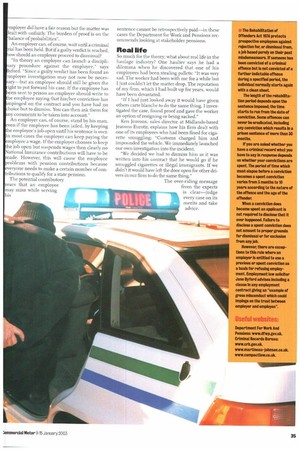The Rehabilitation of Offenders Act 1974 protects prospective employees against
Page 35

If you've noticed an error in this article please click here to report it so we can fix it.
rejection for, or dismissal from, a job based purely on their past misdemeanours. If someone has been convicted of a criminal offence but is not convicted of a further indictable offence during a specified period, the individual normally starts again with a clean sheet.
The length of the rehabilitation period depends upon the sentence imposed; the time starts to run from the date of conviction. Some offences can never be eradicated, including any conviction which results in a prison sentence of more than 30 months.
If you are asked whether you have a criminal record what you have to say in response depends on whether your convictions are spent. The period of time which must elapse before a conviction becomes a spent conviction varies from 3 months to 10 years according to the nature of the offence and the age of the offender When a conviction does become spent an applicant is not required to disclose that it ever happened. Failure to disclose a spent conviction does not amount to proper grounds for dismissal or for exclusion from any job.
However, there are exceptions to this rule where an employer is entitled to use a previous or spent conviction as a basis for refusing employment. Employment law solicitor Jane Byford advises including a clause In any employment contract giving an '`example of gross misconduct which could impinge on the trust between employer and employee".
Useful weiniten, :
Department For Work And Pensions: www.tifwp.gov.uk. Criminal Records Bureau; www.crb.gov.uk. www.martineau-johnson.co.uk. www.compactlaw.co.uk.
























































































































































